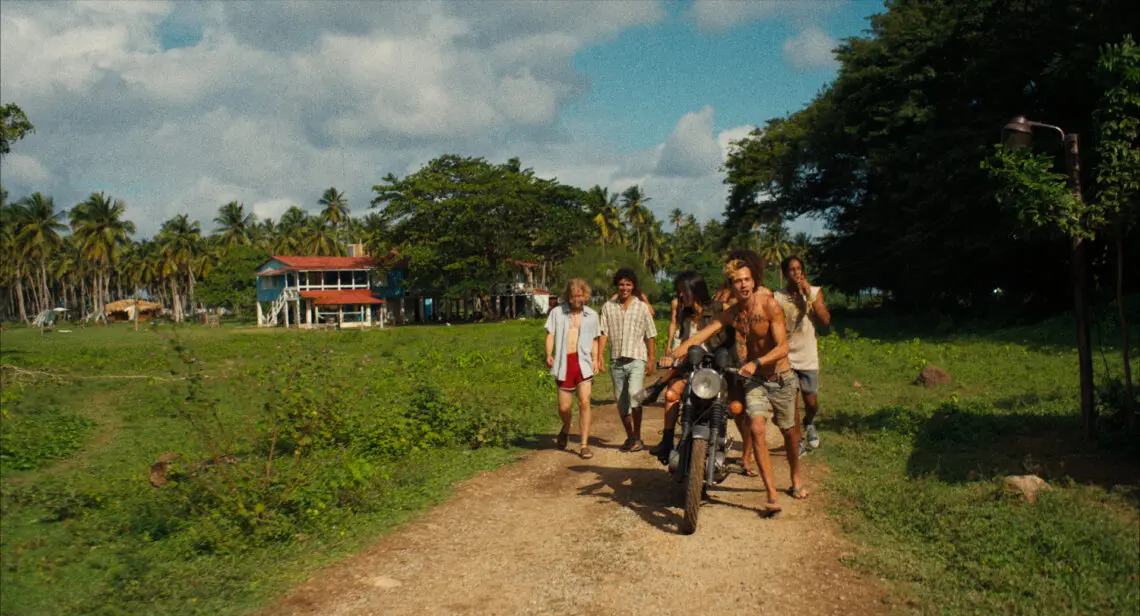Traveling through clandestine airwaves, Kurt Cobain touched down in Havana, Cuba, in the turbulent early 1990s. A time of dire economic hardship for the island nation after the fall of the Soviet Union, the “Special Period” pushed thousands of Cubans to migrate, risking their lives at sea. Those who stayed suffered through great scarcity (the U.S. embargo played its part). The grunge star never visited in person, but via the radios of locals illegally tuning in to stations from the U.S. after Fidel Castro banned rock music. One of those listeners, 18-year-old Gustavo (Eros de la Puente), will later try to cover Nirvana’s iconic song in the vibrant Spanish-language drama “Los Frikis,” from Tyler Nilson and Michael Schwartz, the filmmakers behind the moving buddy movie “The Peanut Butter Falcon.”
Produced by Phil Lord (who is Cuban American) and Chris Miller, “Los Frikis” is based on the real-life drastic measure of self-preservation that hundreds of young people living on the margins of society — hurting for food and under constant attack from the regime — took at the time. They willingly contracted HIV in order to be sent to government-funded sanatoriums. That’s the choice made by Gustavo’s rage-fueled older brother Paco (Héctor Medina), a punk rocker whose chest tattoo reads “Basura” (Trash), a defiant embrace of what the system has deemed him: an irredeemable pariah. The term “friki” applied to anyone existing outside of the state’s rigid social norms.
Popular on Variety De la Puente, a revelation of a first-time actor, plays Gustavo with a palpable earnestness, as his eyes open to the misery that surrounds him. The innocent young man hasn’t yet earned his stripes as a true friki, and thus the film takes the shape of a coming-of-age tale wedged into this historical context rather than focusing on those already fully jaded by their harsh circumstances. Taking this perspective as their way in, Nilson and Schwartz opt for a more hopeful outlook rather than dwell on the real-life bleakness.
That narrative decision is cause for ambivalent sentiments given the stakes. Certain moments of unabashed emotion where the music swells feel attuned to the vivid realism of cinematographer Santiago Gonzalez’s hyperactive camera. However, their luminosity might also read like an unwillingness, on the artists’ part, to step fully into the darkness. It’s also true that such rousing energy speaks to the frikis’ inherent defiance. Their very existence can be interpreted as a political act, their joy an ideological weapon against the oppressors.
Famished but afraid of injecting himself with an HIV patient’s blood (a method many used), Gustavo secretly gets a fake diagnosis from a benevolent doctor. He departs the urban decay of the capital city for the lush greenery of the countryside sanatorium where he reconnects with Paco. No one must know he’s in fact not HIV positive. With unending kindness, Maria (Adria Arjona), a young divorcee whose brother died of AIDS-related health issues, runs the operation. The on-the-rise actress, recently seen in Richard Linklater’s “Hit Man,” showcases here not only that she’s a fully bilingual performer, but also her capacity for occupying a different, complex dramatic register, one of exuberance-veiled sadness.
Removed from survival mode — marked by the uncertainty of not knowing where their next meal would come, and the assurance that violence would come their way — the young men and women under Maria’s care behave as others their age would: They play baseball, rehearse their rocks tracks and pitch in for the common good (in a way that actually leads to shared wellness). Those who’ve never experienced anything close to their adversity might see nothing extraordinary about what this place offers. Inside this microcosm, hemophobia and stigma are kept at bay. But that normalcy, security and freedom feels paradisical for the frikis. There, Gonzalez frames Gustavo in wide shots, as if to call attention to the airiness of these natural environments where he can finally breathe.
But such revelry for Cuba’s outcasts, for the first time allowed to be unbound, comes at an unthinkable price. The summer camp atmosphere of careless afternoons and camaraderie slowly vanishes as Gustavo witnesses those around him deteriorate. The consequences of their resolve, exercised under duress, become visible. As for Gustavo, the guilt of his transgression, sharing in the basic necessities gained without risking death the same way, troubles him. Nilson and Schwartz handle the sensitive subject with curiosity and respect. Rather than simplistically lionizing the frikis, the directors honor their plight by portraying them as an example of how the human spirit perseveres even when nearly crushed.
Almost a decade ago, Medina played the title character in the Cuba-set Irish production “Viva,” about a gay teen who finds community among drag queens. Now the actor gives an indomitable, force-of-nature performance that grounds the picture with its unglamorous bravery. At first, Paco worries that his gentler sibling might not be prepared to face their brutal reality, thus he engages him through tough love. But it’s the poignant turn of the tables in their relationship — as Paco becomes fragile and vulnerable and Gustavo asserts his own power — that ultimately renders the film a potently stirring relay race, where a battalion holds out until the backup arrives to keep on fighting for freedom, to stay alive.

 Italian
Italian







